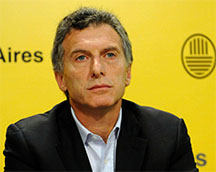ASUNCION (Reuters) – Argentine President Mauricio Macri started his second week in office by asking regional trade bloc Mercosur to back his appeal for the freedom of jailed opposition leaders in Venezuela.
The centre-right Macri won the presidency last month promising free-market solutions to Argentina’s long list of economic problems. He spoke during his election campaign about suspending Venezuela from Mercosur until the jailed politicians are freed.
“I ask for the prompt liberation of political prisoners in Venezuela,” Macri said in addressing a Mercosur meeting yesterday in the outskirts of the Paraguayan capital of Asuncion.

Venezuelan President Nicolas Maduro did not attend the meeting. But Venezuela’s representative in Asuncion, Foreign Minister Delcy Rodriguez, told Macri to back off.
“You are meddling in Venezuela’s affairs,” she said.
This month Venezuela’s opposition took two-thirds of the legislature’s 167 seats in a landslide victory driven by anger over the country’s prolonged economic crisis. It will hold a congressional majority for the first time since Maduro’s mentor, the late socialist leader Hugo Chavez, rose to power in 1999.
The opposition has said the first priority for the new Congress will be an amnesty for the release of jailed opposition leaders, many of whom were jailed for their involvement in anti-government protests in 2014.
The United States, the United Nations, the European Union and others have increasingly pressured Maduro over jailed opposition leaders, particularly hard-liner Leopoldo Lopez who was convicted of fomenting 2014 protests that led to 43 deaths.
During the campaign Macri said Venezuela should be suspended from Mercosur, citing a clause in the bloc’s charter that seeks to punish anti-democratic governments with isolation from the group. He backtracked for the comments after Maduro recognized the opposition’s win in the legislative election.
Macri, meanwhile, faces tough economic challenges at home, including low central bank reserves, double-digit inflation and a sovereign bond default left by Argentina’s previous leader, Cristina Fernandez.








